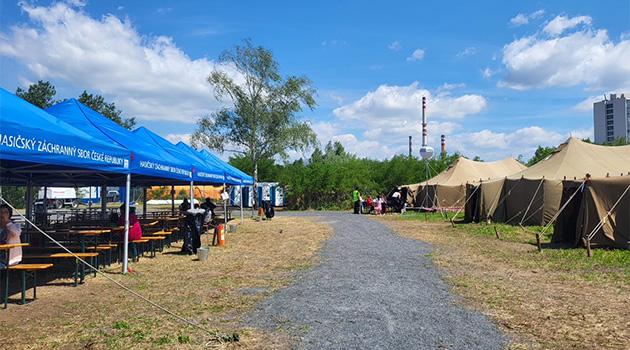One refugee camp in Czech capital is now closing, remaining refugees from Ukraine there will be moved to another camp this afternoon

Prague City Hall has transferred the container units and some of the other backup equipment from the camp being used by Romani refugees from Ukraine in the Malešice neighborhood of Prague to another refugee camp in the Troja quarter of the Czech capital. The remaining refugees will be relocated there this afternoon.
Tadeáš Provazník, a spokesperson for city hall, has informed the Czech News Agency (ČTK) of the process. The number of refugees currently living in both camps is 64.
City Hall has decided to consolidate both camps into the Troja facility due to the low number of refugees currently taking advantage of them. “In the late morning the container units and some of the other backup equipment was transferred,” Provazník said.
“This afternoon the people from the little tent city in Malešice will be moved to Troja, after which the larger equipment will also be transferred. We assume the little tent city in Malešice should be cleared away by 15:00 at the latest,” the City Hall spokesperson told ČTK.
“From tomorrow [Wednesday] just the little tent city in Troja will be operating,” Provazník said. The capacity of the facility combining the two camps will be 250 beds and roughly 30 people will run it.
Mayor of Prague Zdeněk Hřib (Pirate Party) told ČTK yesterday that City Hall would close the refugee camp in Malešice but that it would remain in place for roughly another month so that if necessary, operations can be renewed there. About 1,200 refugees, most of them children and women, found support at the Malešice refugee camp, which was intended for refugees who had lost other housing or who were not eligible for temporary protection in the Czech Republic for various reasons.
Martin Šimáček, director of the Center for Social Services Prague (CSSP), which ran the Malešice operation, said the refugees’ average length of stay there was about three or four days. “They are quite frequently in bad shape when they arrive,” he told news server Romea.cz
“They have been migrating around the Czech Republic or between Central European countries. Often they are so fatigued as to be on the brink of exhaustion, the children are usually sick,” the director said.
“We provide them accommodation, food, and psychosocial aid,” he described the nonprofit organization’s work to news server Romea.cz. “We discuss with them what they will do next.”
“Professional social workers are available there for them,” Šimáček said. More than 2,400 refugees have passed through the camps at Malešice and Troja; Prague’s first refugee camp, which has mostly been used by Romani refugees from Ukraine, was opened by City Hall in the Troja quarter with a capacity of 150 beds on Saturday, 14 May, and during that first weekend, 142 refugees found shelter there.
At the close of May and start of June another location with the same capacity began operating in Malešice. On 11 July, Prague reopened the Regional Assistance Center in the Vysočany neighborhood after keeping it closed for almost a month, allegedly because accommodation capacities in the capital had been exhausted.
The center is currently functioning and is providing refugees from Ukraine with all of the necessary services except accommodation referrals – with the exception of the opportunity to spend the night in a refugee camp on an emergency basis or facilitating access to beds managed by the Refugee Facilities Administration, which is run by the state. Since the beginning of Russia’s invasion of Ukraine in February, according to data from the Interior Ministry, 400,000 refugees have been granted temporary protection in the Czech Republic, 91,000 of them in Prague.
